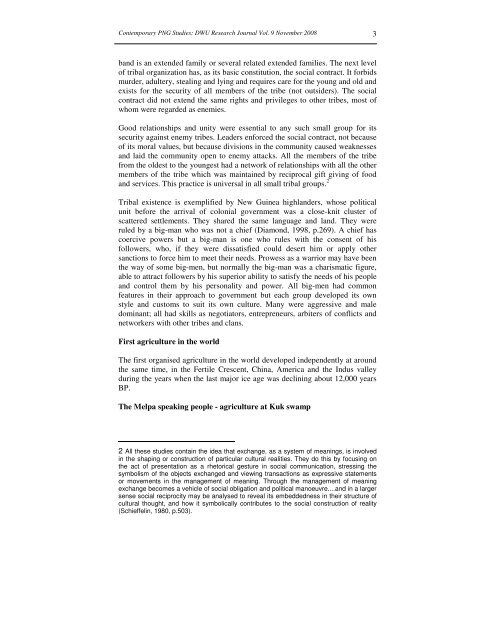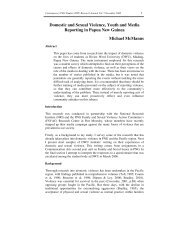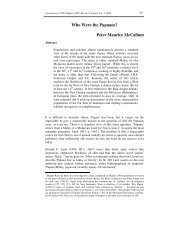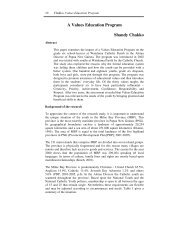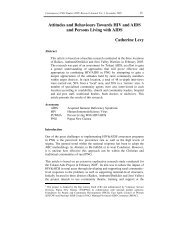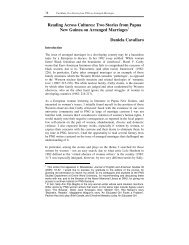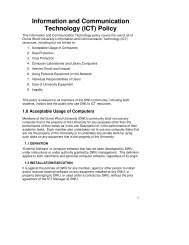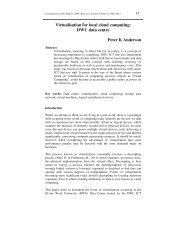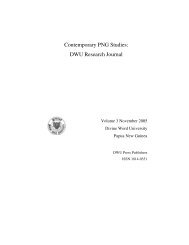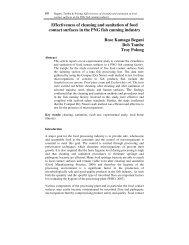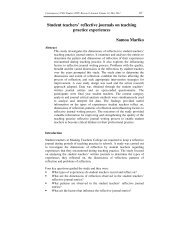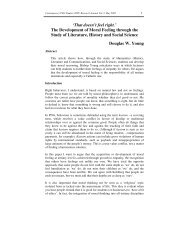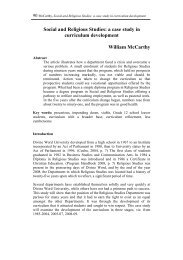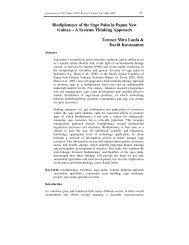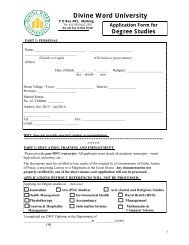A short study of Melpa rehistory - Divine Word University
A short study of Melpa rehistory - Divine Word University
A short study of Melpa rehistory - Divine Word University
- No tags were found...
You also want an ePaper? Increase the reach of your titles
YUMPU automatically turns print PDFs into web optimized ePapers that Google loves.
Contemporary PNG Studies: DWU Research Journal Vol. 9 November 2008 3band is an extended family or several related extended families. The next level<strong>of</strong> tribal organization has, as its basic constitution, the social contract. It forbidsmurder, adultery, stealing and lying and requires care for the young and old andexists for the security <strong>of</strong> all members <strong>of</strong> the tribe (not outsiders). The socialcontract did not extend the same rights and privileges to other tribes, most <strong>of</strong>whom were regarded as enemies.Good relationships and unity were essential to any such small group for itssecurity against enemy tribes. Leaders enforced the social contract, not because<strong>of</strong> its moral values, but because divisions in the community caused weaknessesand laid the community open to enemy attacks. All the members <strong>of</strong> the tribefrom the oldest to the youngest had a network <strong>of</strong> relationships with all the othermembers <strong>of</strong> the tribe which was maintained by reciprocal gift giving <strong>of</strong> foodand services. This practice is universal in all small tribal groups. 2Tribal existence is exemplified by New Guinea highlanders, whose politicalunit before the arrival <strong>of</strong> colonial government was a close-knit cluster <strong>of</strong>scattered settlements. They shared the same language and land. They wereruled by a big-man who was not a chief (Diamond, 1998, p.269). A chief hascoercive powers but a big-man is one who rules with the consent <strong>of</strong> hisfollowers, who, if they were dissatisfied could desert him or apply othersanctions to force him to meet their needs. Prowess as a warrior may have beenthe way <strong>of</strong> some big-men, but normally the big-man was a charismatic figure,able to attract followers by his superior ability to satisfy the needs <strong>of</strong> his peopleand control them by his personality and power. All big-men had commonfeatures in their approach to government but each group developed its ownstyle and customs to suit its own culture. Many were aggressive and maledominant; all had skills as negotiators, entrepreneurs, arbiters <strong>of</strong> conflicts andnetworkers with other tribes and clans.First agriculture in the worldThe first organised agriculture in the world developed independently at aroundthe same time, in the Fertile Crescent, China, America and the Indus valleyduring the years when the last major ice age was declining about 12,000 yearsBP.The <strong>Melpa</strong> speaking people - agriculture at Kuk swamp2 All these studies contain the idea that exchange, as a system <strong>of</strong> meanings, is involvedin the shaping or construction <strong>of</strong> particular cultural realities. They do this by focusing onthe act <strong>of</strong> presentation as a rhetorical gesture in social communication, stressing thesymbolism <strong>of</strong> the objects exchanged and viewing transactions as expressive statementsor movements in the management <strong>of</strong> meaning. Through the management <strong>of</strong> meaningexchange becomes a vehicle <strong>of</strong> social obligation and political manoeuvre....and in a largersense social reciprocity may be analysed to reveal its embeddedness in their structure <strong>of</strong>cultural thought, and how it symbolically contributes to the social construction <strong>of</strong> reality(Schieffelin, 1980, p.503).


